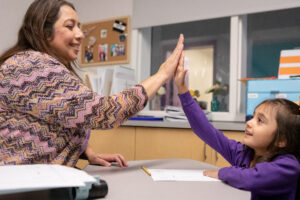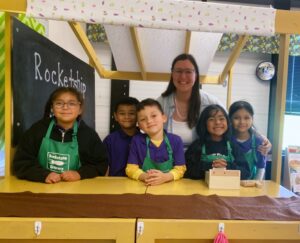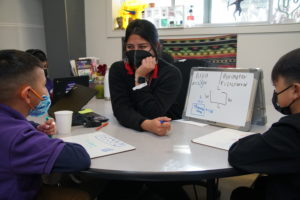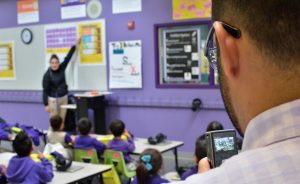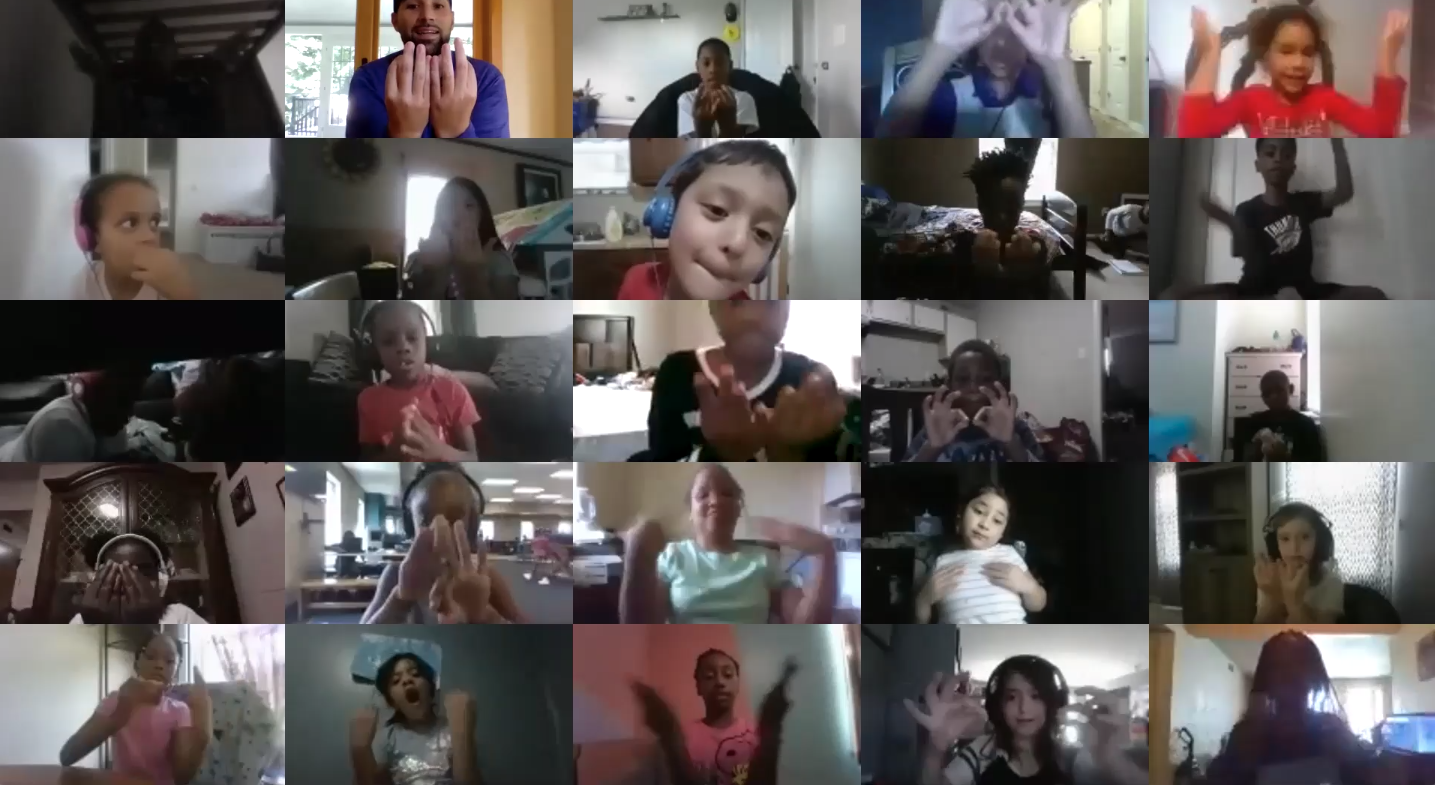
Prioritizing Equity with Virtual Special Interest Clubs
Arlynda Watts, Enrichment Center Coordinator, Rocketship Nashville Northeast Elementary
I have never had a class of 32 kindergarteners cleaned up, ready, and lined up faster than when we might be late for enrichment classes. Teachers love this time because it’s our opportunity to plan, prepare for any lessons, and have one more sip of that iced coffee from the morning that is no longer iced. Students love these special classes because it’s an opportunity to change the learning environment and engage with an activity that they don’t experience every day. I mean who wouldn’t love coding in robotics or painting in visual arts?
However, the reality is that enrichment classes are always the first block that gets cut whenever something comes up. If funding is at risk, creativity is generally on the line. A national pandemic hits and the country moves to virtual teaching, and somehow specials seem to just be a memory of in-person teaching. The problem is that access to enrichment is one way that schools provide opportunities for equity to our kids.
Equal Access to High-Quality Enrichments
Enrichment classes are how we integrate content into our students’ days that they normally wouldn’t have. Affluent schools often offer music, art, science, engineering, drama, dance, foreign languages, and the list goes on. If we don’t offer these experiences to our students, will they have access to them somewhere else? Our students deserve these expanded learning opportunities, and it’s up to us to ensure they have them!
When we made the decision to go virtual this year, we turned our enrichments into what we now call Special Interest Clubs. Every day at 1 p.m. our students can log on to Zoom and join their favorite club. We currently offer Spanish, poetry, chess, yoga, American sign language, Actor’s Studio, cooking, coding, art, multimedia, science, Folklorico dancing, and line dancing! And wow, you’d be surprised how dear these clubs are to our students’ hearts.
Inside Our Clubs
In this video, you’ll see a clip from our students learning a phrase in sign language. Next up, get your goggles and lab coat ready because our very own Bill Nye, aka Ms. Watts, teaches students about electricity. You can read her reflection on her science club below and then check out the Q&A to learn how to start your own Special Interest Club.
“When you think of science you may think of space, atoms, protons, chemistry, etc. Well, science is so much more than just those scientific terms. Science can be a mode of communication by exploring and learning. Children from all backgrounds can come together and explore the world through the lens of science. Learning how the world is created, how it functions, and the beauty that it holds becomes a shared experience and all it takes is a science class! The world is a beautiful creation and science allows all learners to explore it beyond their home environment. It’s an escape from their everyday usual and opens their mind to a world of imagination and truth! So, for just an hour out of their day, kids can see the world and all it has to offer their young minds.”
How to Start Your Own Special Interest Club
So, you may be wondering – what do I need to do to make this come to life in my classroom? Ms. Watts has some answers.
Q: How do you decide what topic to choose for a club?
A: Choosing science was easy for me because I am a science teacher at my school. It’s what I love. My best advice though is to choose something that you are passionate about and that will spark interest with your students. You know your kids best, think about their interests, but don’t be afraid to break their normal with something unique. If you are stuck, think about what enrichments your school traditionally offers and start there.
Q: How much time per day or week do you allot to clubs?
A: While we designate 45 minutes, five times per week, do what is sustainable for you. Meet two or three times a week. Remember, it’s also easier to add a day down the road than take a day away. The point is to provide access to an engaging lesson or activity so think deeply about what your commitment is and go from there!
Q: Where do you get inspired for lessons for these clubs? How much time does it add to your current lesson-planning load?
A: I’m going to be honest here – this is my opportunity to conduct all the super fun and out of the box lessons that I’ve always wanted to do. We have fun with it. I look up unique activities and also pull from our school’s science curriculum. We’ve gone on virtual science trips and carried out numerous experiments. While this does take additional time to plan, we’ve found it’s the part of our day that we actually want to plan! I spend about two hours each week ensuring that I am prepared. And it’s only that long because I plan for five days a week. Just remember, you don’t have to reinvent the wheel, have fun!
Q: What advice do you have for a teacher who is already feeling overwhelmed with virtual teaching but is interested in offering something like this?
A: I get it. Virtual teaching a beast in itself. The key here is to focus on the kids. This time shouldn’t be a burden. Yes, it’s going to take some work, but let your creativity flow. The kids are going to have fun, and I promise, so will you!
Published on August 15, 2020
Read more stories about: Pay It Forward, Tips for Engagement.
In the Classroom
Parent Conference Tips for First Year Teachers
Jeremiah David, Paraprofessional, Rocketship Dream Community Prep | January 6, 2025
Looking for top parent conference tips? Prepare with advice from our educators.
Read more ⟩First Year Teacher? Here are Five Mistakes to Avoid.
Jeremiah David, Paraprofessional, Rocketship Dream Community Prep | November 1, 2024
See what mistakes most first year teachers make and how you can get ahead this school year with some simple tips from a fellow educator.
Read more ⟩3 Classroom Systems New Teachers Swear By
Rocketship Public Schools | Sept. 30, 2024
As a first year teacher, establishing a smooth and productive classroom environment can feel a tad overwhelming. Thankfully, these simple strategies can go a long way.
Read more ⟩How Co-Teacher Collaboration Can Benefit Your Classroom
Featuring Alejandra Chavez, Education Specialist at Rocketship Mosaic Elementary | June 10, 2024
Hear from Ms. Aly about how a small team of educators can make a big difference in student outcomes through thoughtful planning, focused collaboration, and personalized accommodations. Ms. Aly was one of our highest-performing educators in California for the 23-24 school year.
Read more ⟩How to Spark Joy in ESL Classrooms with a Multilingual Learning Clubhouse
Featuring Ms. Amy De La Rosa, Multilingual Specialist, Nashville Northeast Elementary | June 1, 2023
Listen in to an audio interview with Amy De La Rosa, a Multilingual Specialist who has worked as an educator for over 14 years and found an innovative way to help her students learn English in a more accelerated, playful way.
Read more ⟩Supporting Parents of Multilingual Students in Family/Teacher Conferences
Emma Volpe, Rocketship United Academy | June 1, 2022
Get thoughtful insight on how to create a more inclusive family-teacher conference environment.
Read more ⟩5 Ways to Strengthen Relationships in the Classroom
James Cross, Assistant Principal, Rocketship Nashville Northeast Elementary | February 20, 2022
A new age of education calls for a new level of connection. Here are some key tips to strengthen relationships in your classroom this school year.
Read more ⟩5 Ways School Leaders Can Coach and Support Teachers
Eesir Kaur, Director of Professional Development | October 15, 2020
Are you a school leader looking to coach your teachers more effectively? Here's what works for us.
Read more ⟩




